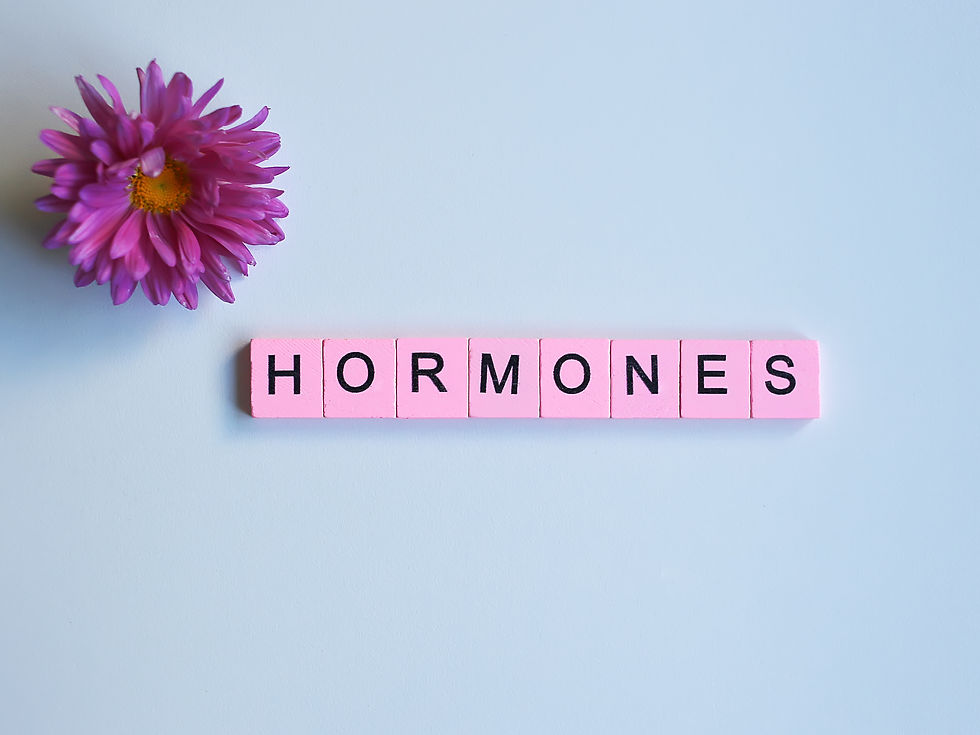The Silent Symphony: How Hormones Impact Mental Health
- Cactus Bloom Counseling

- Aug 6, 2025
- 3 min read
Hormones are often associated with physical changes, such as growth spurts in adolescence, supporting a pregnancy or the hot flashes of menopause. However, their influence extends far beyond the physical, playing a crucial role in shaping our mental health. These powerful chemical messengers are integral to our brain function and emotional well-being, and their imbalance can lead to a variety of mental health issues.

The Brain-Hormone Connection Hormones are produced by glands in the endocrine system and travel through the bloodstream to tissues and organs, including the brain. They regulate various physiological activities, such as growth, metabolism, and mood. Key hormones that significantly impact mental health include cortisol, serotonin, dopamine, and sex hormones like estrogen and testosterone.
Cortisol: Known as the stress hormone, cortisol is released by the adrenal glands in response to stress. While it helps the body manage stressful situations by increasing alertness and energy, chronic stress can lead to consistently high levels of cortisol, which is linked to anxiety, depression, and other mood disorders. Prolonged exposure to elevated cortisol can impair cognitive functions like memory and concentration.
Serotonin and Dopamine: These neurotransmitters, often dubbed the "happy hormones," are critical for mood regulation. Serotonin is associated with feelings of well-being and happiness, while dopamine is tied to pleasure and reward mechanisms. Imbalances in these hormones are commonly linked to mood disorders such as depression and bipolar disorder. For instance, low levels of serotonin are a well-known cause of depression.
Sex Hormones: Estrogen and testosterone also play significant roles in mental health. Estrogen, which fluctuates during menstrual cycles, pregnancy, and menopause, can affect mood stability. Low levels of estrogen have been linked to depression and anxiety, particularly in post-menopausal women. Testosterone, while often associated with male health, is important for both sexes in maintaining mood and mental health. Low levels in men can lead to symptoms of depression and fatigue.
The following hormones and mental health disorders can have high comorbidity:
1. Depression: Depression is often linked to low levels of serotonin and dopamine. Additionally, thyroid imbalances and changes in estrogen and testosterone levels can contribute to depressive symptoms. Women are particularly vulnerable during periods of significant hormonal fluctuation, such as postpartum and menopause.
2. Anxiety/PTSD: Elevated cortisol levels are a common marker of anxiety disorders. The body's prolonged response to stress can lead to an overactive fight-or-flight response, manifesting as chronic anxiety.
3. Bipolar Disorder: This disorder is characterized by extreme mood swings, which are influenced by neurotransmitter imbalances. Hormonal changes, particularly those involving estrogen, can trigger or exacerbate mood swings in bipolar disorder.
4. Premenstrual Dysphoric Disorder (PMDD): This severe form of premenstrual syndrome (PMS) is directly related to hormonal changes during the menstrual cycle. It can cause extreme irritability, depression, and anxiety in the luteal phase of the menstrual cycle.
5. Postpartum Depression: The drastic drop in estrogen and progesterone after childbirth can trigger this severe form of depression. The hormonal changes, combined with the stress of caring for a newborn, contribute to this condition.
Understanding the interplay between hormones and mental health is crucial for effective treatment and management. Strategies to manage hormonal influences on mental health include:
Lifestyle Changes- Regular exercise, a balanced diet, adequate sleep, and stress management techniques like mindfulness and meditation can help regulate hormone levels and improve mental health. Getting sunlight on a regular basis to regulate vitamin D production can help regulate hormones.
Therapy- Psychotherapy can provide coping mechanisms for dealing with the emotional impacts of hormonal changes. It can also help bring down cortisol levels and get the body/brain out of fight/flight/freeze overdrive.
Medical Interventions- In some cases, more specific medical treatments like thyroid medications or hormonal replacement therapy might be necessary to balance hormone levels if there are other underlying causes to hormone imbalance.
Hormones are an essential, though often overlooked, component of mental health. Their intricate and dynamic interactions with brain function underscore the importance of a holistic approach to mental health care. By recognizing and addressing hormonal influences, we can better manage and treat mental health disorders, paving the way for improved overall well-being. At Cactus Bloom Counseling we can help you create lifestyle changes that are supportive of a healthy hormonal balance and help regulate your nervous system. If you do need medical intervention we can offer referrals to medical professional that specialize in hormonal regulation.




Comments